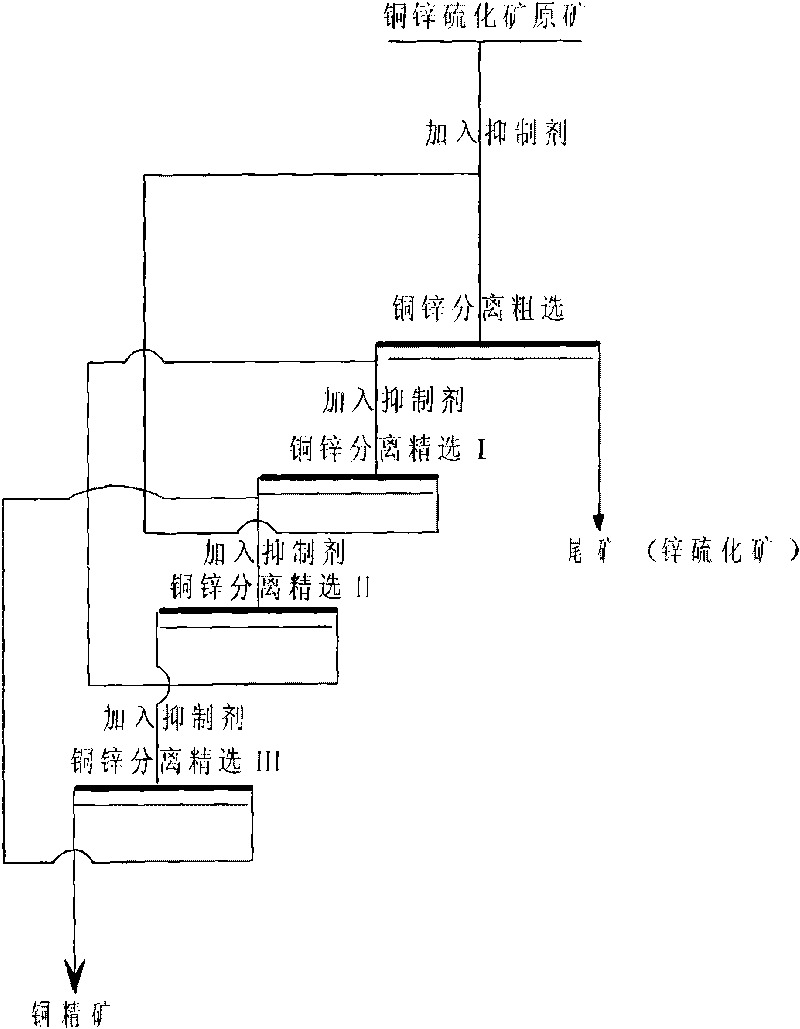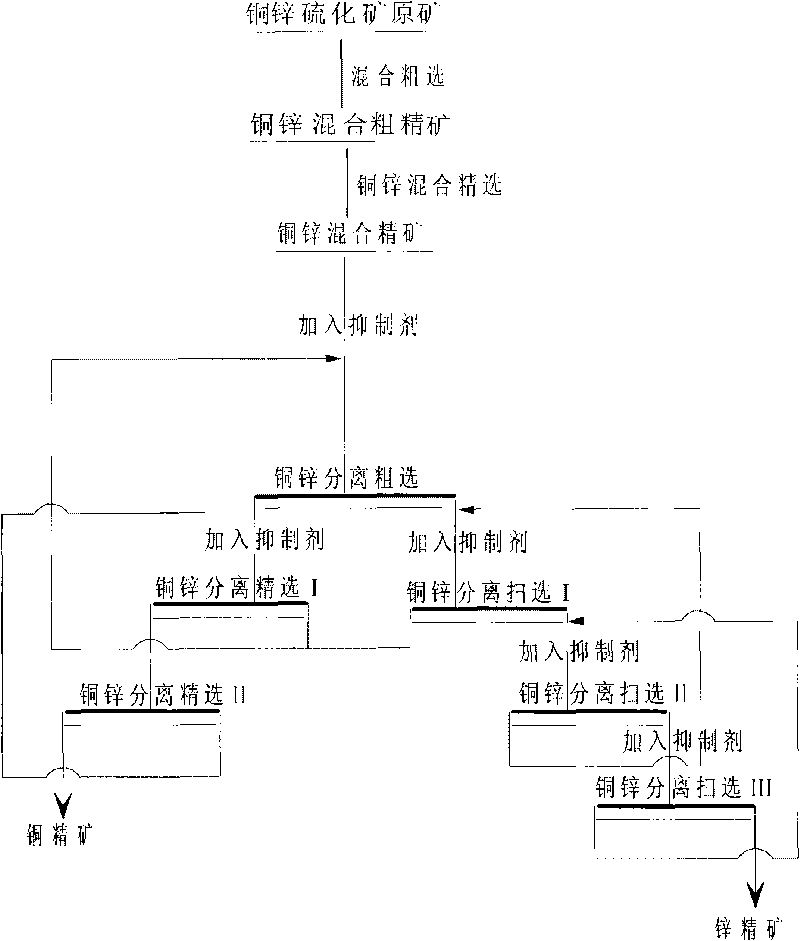Separation method of copper-zinc sulphide minerals
A separation method and mineral technology, applied in the direction of solid separation, flotation, etc., can solve the problems of unsatisfactory flotation separation effect, large consumption of chemicals, and environmental damage, and achieve improved production conditions, less environmental pollution, and suppression ability strong effect
- Summary
- Abstract
- Description
- Claims
- Application Information
AI Technical Summary
Problems solved by technology
Method used
Image
Examples
Embodiment 1
[0017] This embodiment 1 provides a method for separating copper-zinc sulfide minerals, which uses the raw ore of copper-zinc sulfide minerals as raw material, and performs preferential flotation separation on the raw ore of copper-zinc sulfide minerals to obtain copper concentrate minerals. The method includes :
[0018] Using the raw ore of copper-zinc sulfide minerals as raw material, the raw ore of copper-zinc sulfide minerals is separated and roughed to obtain copper rough concentrate minerals; during the process of separating and roughing the raw ores of copper-zinc sulfide minerals, water-soluble thioglycolate or mercapto Acetic acid as an inhibitor of zinc sulfide minerals in the separated minerals;
[0019] Afterwards, the obtained copper rough concentrate minerals are refined and separated to obtain copper concentrate minerals. In the copper rough concentrate mineral refining process, water-soluble thioglycolate or thioglycolic acid is also added as a Inhibitors of ...
Embodiment 2
[0028] This embodiment 2 provides a method for separating copper-zinc sulfide minerals, which uses the raw ore of copper-zinc sulfide minerals as raw material, and performs preferential flotation separation on the raw ore of copper-zinc sulfide minerals to obtain copper concentrate minerals. The separation method that embodiment 1 provides is basically the same, and the difference is that in the flotation separation process to minerals, potassium thioglycolate is used as the inhibitor to zinc sulfide minerals in the separated minerals, and the specific steps are as follows:
[0029] The copper-zinc ore raw ore grade used is Cu 0.61%, Zn 11.23%. The raw ore ore is added to the flotation tank for copper-zinc separation and roughing operation. During the separation and roughing process, potassium thioglycolate is added as the zinc sulfide in the separated minerals Inhibitor, the amount of inhibitor added is 500g / t, that is, 500g inhibitor is added for each ton of separated mineral...
Embodiment 3
[0033] The present embodiment 3 provides a method for separating copper-zinc sulfide minerals, which uses the raw ore of copper-zinc sulfide minerals as raw material, and performs preferential flotation separation on the raw ore of copper-zinc sulfide minerals to obtain copper concentrate minerals. The separation method that embodiment 1 provides is basically the same, and the difference is that in the flotation separation process to minerals, ammonium thioglycolate is used as the inhibitor to zinc sulfide minerals in the separated minerals, and the specific steps are as follows:
[0034] The copper-zinc ore grades used are Cu 0.55% and Zn 4.98%, and the raw ore is added to the flotation tank for copper-zinc separation and roughing operation. During the separation and roughing process, ammonium thioglycolate is added as the zinc sulfide in the separated minerals Inhibitor, the amount of inhibitor added is 260g / t, that is, 260g inhibitor is added for each ton of separated minera...
PUM
 Login to View More
Login to View More Abstract
Description
Claims
Application Information
 Login to View More
Login to View More - Generate Ideas
- Intellectual Property
- Life Sciences
- Materials
- Tech Scout
- Unparalleled Data Quality
- Higher Quality Content
- 60% Fewer Hallucinations
Browse by: Latest US Patents, China's latest patents, Technical Efficacy Thesaurus, Application Domain, Technology Topic, Popular Technical Reports.
© 2025 PatSnap. All rights reserved.Legal|Privacy policy|Modern Slavery Act Transparency Statement|Sitemap|About US| Contact US: help@patsnap.com


